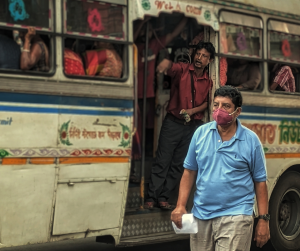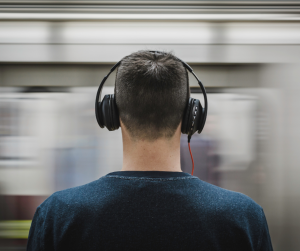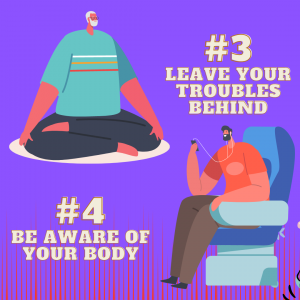“There were a lot of times when I would arrive at my workplace already stressed out, and I hadn’t even started my work day, because the commute had been awful. My commute is a sort of a soul-sucking experience.”
Every day, millions of people around the world face long commutes to work. In the United States alone, approximately 25 million workers spend more than 90 minutes each day getting to and from their jobs, and about 600,000 “mega-commuters” travel at least 90 minutes each way, according to the U.S. Census Bureau. In the United Kingdom, the average round-trip commute takes 54 minutes (up from 45 minutes in 2003), and in most of the world’s major cities, from Milan to Manila, it’s over an hour.
And yet few people enjoy their commutes.
Research on commuting shows that it can have positive and negative effects on well-being and mental health, experts said. Shorter trips and active commuting, such as walking or riding an electric skateboard, can be beneficial buffer periods that help with transitioning between work and home life. But people’s satisfaction tends to decrease over the duration of a commute, and congestion, crowding and unpredictability can be stress-inducing, according to a review of commuting research published in 2019.
Studies have found that people with long commutes are more exhausted and less productive at work, and have lower job satisfaction. And a study conducted in Sweden in 2011 found that couples have a 40% higher chance of getting divorced when one partner commutes at least 45 minutes to work each day.
But it doesn’t have to be this way. Research suggests that small tweaks can improve your commuting experience, leaving you happier and more productive.
The problem of Commuting in MegaCities
Growing populations, aging and inefficient transport systems and rising car ownership in the world’s biggest cities are leading to greater congestion and reduced productivity.
What a welcome….#mayanagari #mumbaitraffic pic.twitter.com/fNjCpBxroR
— Madan Singh Solanki (@Solanki143Madan) February 15, 2023
Nearly half of Mumbai commuters spend at least one or two hours to get to work, far more than workers in smaller rivals such as Chennai, or Hyderabad. Fifty percent of formal sector workers expressed the desire to move elsewhere, in part to escape brutal train or car commutes; only a third of workers in other cities expressed this sentiment.
In recent decades, Asia has experienced rapid development of industrialization and urbanization, which has resulted in the accelerated growth of many suburban cities surrounding large metropolitan areas. These suburbs are home to many who work in metropolitan areas, causing a tremendous number of suburban residents each day to commute to the city for work. As a consequence, urban areas are experiencing increasing automobile use, resulting in congestion and long hours of commuting. The increasing severity and duration of traffic congestion greatly intensify pollutant emissions and degrade air quality.
It is of tremendous concern that commuters are exposed to high concentrations of atmospheric pollutants, originating from both vehicular traffic and other urban, industrial, or environmental factors, during their transit. They are exposed during their daily commute while in vehicles, waiting for transportation, and walking.
 The critical question for the future is whether the situation will continue to deteriorate. If levels of car ownership continue to rise and the authorities refuse to place limits on where people can drive, congestion is bound to worsen. There is a clear need for more investment in public transport systems and for their better management, but whether government budgets will be able to bear such costs and whether the private sector can be tempted to invest in public transport are open questions. Deregulation and privatization may help improve public transport facilities, but current evidence is ambivalent with respect to the likely outcome. Certainly, if deregulation and privatization mean that the real costs of public transport improvements are passed on to passengers, then they may hurt the poor. In so far as such a strategy will increase the cost to poor people of getting to work or to local supermarkets, it will clearly reduce their living standards.
The critical question for the future is whether the situation will continue to deteriorate. If levels of car ownership continue to rise and the authorities refuse to place limits on where people can drive, congestion is bound to worsen. There is a clear need for more investment in public transport systems and for their better management, but whether government budgets will be able to bear such costs and whether the private sector can be tempted to invest in public transport are open questions. Deregulation and privatization may help improve public transport facilities, but current evidence is ambivalent with respect to the likely outcome. Certainly, if deregulation and privatization mean that the real costs of public transport improvements are passed on to passengers, then they may hurt the poor. In so far as such a strategy will increase the cost to poor people of getting to work or to local supermarkets, it will clearly reduce their living standards.
When Commuting gets really ugly
#Photography Michael Wolf, from his “Tokyo Compression” series, Tokyo.
(Series of candid portraits of Japanese commuters enduring the inhuman daily crush of bodies in Tokyo’s subway cars.) pic.twitter.com/38Jz1gnWNh— H e t e r o t o p ia (@ArtsOfExistence) October 16, 2022
‘Tokyo Compression’ – A Series Of Tokyo Commuter Portraits By Photographer Michael Wolf. Michael Wolf made a series of candid portraits of Japanese commuters enduring the inhuman daily crush of bodies in Tokyo’s subway cars. The results are visceral, unforgettable, and almost suffocating.
… it is the ability to tolerate an elbow in the back and a cheek unceremoniously pasted against a window that sets Tokyo’s commuters apart. There are few arguments, and fights are almost unheard of; it’s as if the powerless, massed ranks of the travelling public have entered into a non-aggression pact … and one that is observed, for the most part, in near silence.
– The Guardian
Tokyo Compression, Michael Wolf pic.twitter.com/AnRqkxEgUX
— Zbiggi (@wojtysiak22) June 24, 2018
Visualizza questo post su Instagram
Wolf’s pictures became an incredibly powerful metaphor for an aspect of modern society and kicked lose a great deal of thought about living conditions in megacities.
If you can, Try to find an Alternative
Instead of driving or hopping on a very busy train, if available, consider options like cycling or walking. You could even (safely) wheel, skateboard, or scoot. These options reduce your carbon footprint and can be great ways to engage with the space between your home and destination. For example, cycling and walking offer great opportunities to explore sights smells, and sounds. You may discover a new local business to visit or bump into an old friend!
Riding an electric Skateboard offers a rich sensory engagement with the world around us, unlike the cocooned ‘blandscape’ of the private car. We transform spaces into places by inscribing meaning onto them. Even the most apparently mundane area can be brought to life by a scent, a memory, or a sound. These fragments provide glimpses of how the place is performed through everyday interactions.
While living in Rome, I used to commute to my university for 1 hour every day, and…I loved it! The commute is hated among many — most people actually (especially in Rome). I’m part of the small percentage that used to love their commute.
While living in the city, commuting by bus and foot allowed me to do many things that would generally be pushed aside due to my ‘busy’ schedule. During my commute, I liked to listen to podcasts and talk with my friends. But, most importantly, my commute was my time for reflection and thought to process. Debriefing anything in life is important. Debriefing allows you to understand what you are doing right and what you are doing that could be improved upon. In order to debrief, you need time and a clear mind, both of which my commute provided.
Let’s see a few suggestions to shake away some anxiety and get the most out of your commuting:
Use the Time To Shift Your Mindset
Your commute is an opportunity to transition from the personal to the professional. At home in the morning, you might play the role of parent, partner, daughter or caregiver. When you arrive at the office, you don your professional hat. In the evening, you might revert to the personal even if you eventually switch to finishing up work before bed. Each of these transitions requires a shift in mindset. If we don’t take the time to make one, the thoughts and concerns that stem from one role are likely to carry over into the next and weigh us down.
Listen to music
Sometimes there’s nothing better than starting the day with some good, upbeat music. Don’t feel like you have to be productive all the time during your commute; you can also take this time to enjoy yourself and relax. Sing your favorite songs, find some groove and just have a good time. Your good mood will carry on when you get to the office and you won’t even know why you’re so happy, but it was probably the high-energy ride that got you pumped up.
Practice Mindfulness
Research shows that for 27% of us, this time spent in transit is wasted. But instead of whiling it away and scrolling our Instagram, why not take the opportunity to focus on your well-being? Practicing mindfulness is perfect for the commute: you don’t need any kit or extra space so it’s ideal for car, bus or train travel, it’s free and it’ll boost your mood for the day ahead.
“To be mindful, I put away my phone and focus on the sensory experience of riding the train. After checking in with my posture, I feel the vibrations in my feet and notice how the muscles in my legs tighten and release to help maintain my balance. (I’m usually standing.) I also look around the car to see the other people here with me. Observing the diversity of people present, I make a mental note that we’re all in this together (literally and figuratively). This reminder of our shared experience always helps to lighten my mood. Too often, we tune out while commuting. Why not use it as a time to deliberately tune-in?”
— Jonathan Kaplan, a psychologist and director of the SOHO CBT and Mindfulness Center, commutes 30 minutes each way by subway in New York.
Most of us try to accomplish too many things at once. As our brains wander to other important tasks, the ones we’re working on can suffer. The result is that we get lots of little jobs done, but don’t really excel at any of them. Taking a step back to refocus and reflect can be just as important as getting everything done quickly. That’s where mindfulness comes in.
From crawling traffic jams to jabbing elbows on the train platform, busy commutes can steal time from our day, leaving us feeling stressed and negative … but what if we could actually claw back that time as ours?
A growing awareness of mindfulness, and its effectiveness in mitigating stress, has led apps like Headspace to offer guided commuting meditations.
How to apply a mindful approach to your own commute? be careful to don’t follow these exercises while crossing a road though 😉
#1 Find your breath: breathing exercises are an excellent way to control anxiety and stress and allow you to control and moderate your response to external pressure (Inhale for four counts, hold for two, and then exhale again for four).
#2 Disconnect from the grid: One of the problems with modern commutes is that they no longer provide downtime – where we can reflect, disconnect and be present at the moment. So put your phone on quiet mode and look at what’s around you, start a conversation with a stranger, or read a book!
#3 Leave your troubles behind: More often than not, it’s not the commute itself that bothers us, but the frustrations we bring to it. Try engaging in positive self-talk by repeating an affirmative mantra for 10-15 times like I FEEL CALM AND IN CONTROL.
#4 Be aware of your body by focusing on the physical sensations (the movement of the abdomen through breathing, the shifting of weight between the feet, the temperature of the air you’re breathing etc.)
#5 Embrace silence
Commute time may be your one chance to listen to a can’t-miss podcast or rock out to your favorite music. While it may be tempting to fill the space, give yourself a little chunk of time to appreciate the silence.
-> Benefits: A 2021 reviewTrusted Source noted that silence has a connection with stillness and the absence of concepts, mental noise, thoughts, and disturbance. The review also noted it has a connection with increased relaxation, improved mood states, altered perception of time, and an orientation toward the present moment. Still, more research is needed to determine the benefits of silence on the individual and societal levels.
-> How to do it: Start by setting aside 5 minutes for nothing but silence. Put your phone on airplane mode, turn off any music, and just listen. Hear the surrounding sounds, both close and far away. Listen to your thought stream with gentleness and detachment. Observe your breath. Can you hear the inhale and exhale?
This empty space can help calibrate the senses to be more deeply attuned to sensory input. It means that when your 5 minutes are up, and you switch on your favorite song, your experience of it may be that much richer.
Allow this space to give rise to a deeper kind of listening.
Final Thoughts
A long daily commute is hell. It is unlikely, even with practicing mindfulness that you will get through it, every single day, with no stress at all.
But taking a few minutes to practice mindfulness during your trip will ease your stress to some degree. It is making the best of a bad situation.
Most people who have long commutes feel like helpless victims enduring a necessary evil. As a result, they arrive at their jobs and homes depleted, and their performance and well-being suffer. But it is possible to improve your commute by turning it into a more positive experience and, when possible, reducing it.
How’s your commute? share your experience and tips by dropping a comment below 😉





